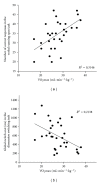Swimming as a positive moderator of cognitive aging: a cross-sectional study with a multitask approach
- PMID: 23326664
- PMCID: PMC3541603
- DOI: 10.1155/2012/273185
Swimming as a positive moderator of cognitive aging: a cross-sectional study with a multitask approach
Abstract
This study examined whether regular swimming in older adults was related to better cognitive functioning and whether there were any global or selective positive effects of this physical activity (PA) on cognition. The cognitive performances of three groups of sixteen volunteer participants (young adults, sedentary older adults, and older adults who regularly practice swimming) were evaluated using a multitask approach. All participants performed a battery of ten tasks: two reaction time tasks assessing information processing speed and eight experimental tasks assessing three executive functions (EFs), (behavioral inhibition, working memory updating, and cognitive flexibility). The results showed that young adults performed significantly better than older adults on all examined cognitive functions. However, in older adults, regular swimming was related to better performance on the three EFs, but not on information processing speed. More precisely, five experimental tasks out of the eight tapping EFs were shown to be sensitive to positive effects from swimming practice. Finally, the demonstrated benefits of swimming on EFs were not necessarily linked to better cardiorespiratory fitness. The present findings illustrate the validity of using a multitask approach in examining the potential benefits of regular PA on cognitive aging.
Figures
References
-
- West RL. An application of prefrontal cortex function theory to cognitive aging. Psychological Bulletin. 1996;120(2):272–292. - PubMed
-
- Albinet CT, Boucard G, Bouquet CA, Audiffren M. Processing speed and executive functions in cognitive aging: how to disentangle their mutual relationship? Brain and Cognition. 2012;79(1):1–11. - PubMed
-
- Phillips LH, Henry JD. Adult aging and executive functioning. In: Anderson V, Jacobs R, Anderson PJ, editors. Executive Functions and the Frontal Lobes: A Lifespan Perspective. New York, NY, USA: Taylor & Francis; 2008. pp. 57–79.
-
- Audiffren M, André N, Albinet CT. Effects of chronic exercise on cognitive functions in older adults: assessment and prospects. Revue de Neuropsychologie. 2011;3(4):207–225.
-
- Hillman CH, Erickson KI, Kramer AF. Be smart, exercise your heart: exercise effects on brain and cognition. Nature Reviews Neuroscience. 2008;9(1):58–65. - PubMed
LinkOut - more resources
Full Text Sources


